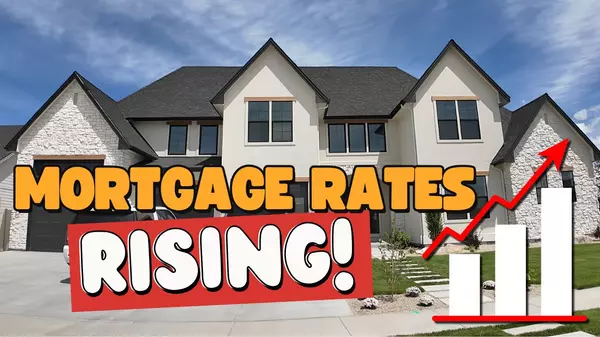Higher Mortgage Rates for Great Credit Homebuyers in Boise, Idaho - Is it TRUE?

"Have you heard about the fee changes the government is making that may be causing people with higher credit scores to pay more to help people with low credit scores? In this video, we're going to dive in to find out if this is really true and break down what it all really means for you when you're buying a home. So, the story here is that Fannie Mae and Freddie Mac changed the fees that they charge on loans that, on the surface, appear to make people with higher credit scores pay more in fees to offset costs for people with lower credit scores. Basically, the perception is people with higher credit scores and higher down payments are now getting penalized in order to help people with lower credit scores and lower down payments buy homes. This has led people to think that if you have a lower credit score, you'll pay less in overall fees, and there were even people suggesting that you should purposely damage and lower your credit score to pay less in fees. So let's just say upfront, please do not do that because that's just not true, and damaging your credit score will definitely cost you. Now, this policy change really has caused a lot of confusion since conflicting messages have been presented by different groups for the reason behind these moves. First, we've got Fannie Mae and Freddie Mac stating categorically the reason for the changes is not at all to encourage purchases of homes by lower credit borrowers or to penalize higher credit borrowers. But then we've got industry groups like The National Association of Realtors coming out saying that this is the reason, and they're encouraging the government to scrap these fee increases. So let me try to clear up this confusion for you. Well, first, who exactly is Fannie Mae and Freddie Mac, and why are they charging fees on loans? No, they're not your great aunt or uncle that you've never heard of. They are the government-run corporations responsible for ensuring the majority of mortgages made in America. By ensuring, it means that they step in to help pay back the companies actually lending the money for home purchases if that home buyer defaults on the loan. Now they have to maintain a certain amount of money in their accounts to maintain what's called liquidity, to make sure that if people do default, they have the funds to pay out the money. Now, in order to maintain those cash reserves, they charge certain fees on home loans. So why did they actually make this change? Well, essentially, in 2008, after the last market crash, Fannie Mae and Freddie Mac were taken into conservatorship, and they called this combined entity the Enterprises. They have to charge fees on loans in order to provide a form of insurance to ensure the taxpayers that now own Fannie Mae and Freddie Mac in case of default of these higher risk borrowers. Over the past couple of years, Fannie Mae and Freddie Mac did a huge risk assessment and realized the existing fee structure didn't accurately reflect the risk profile for each borrower. So basically, what they are saying is that the fee structure that they had implemented after the 2008 crisis was simply outdated, and it wasn't actually working quite well enough to maintain the needed liquidity in the system. They had to restructure the fees according to each individual class of borrower's risk based on credit score, down payment, debt-to-income ratios, and income levels, in order to provide liquidity to Fannie Mae and Freddie Mac and to make sure the taxpayers didn't end up on the hook again for another potential crash. So, they have been undergoing an overhaul to adjust fees and have been making these adjustments on different loan types for about the past two years, for loans like second homes, high-balance loans, and cash-out refinances. Now, this was basically the final stage in that risk rebalancing. On the surface, it does appear that they are passing the risk of the lower credit borrowers onto higher credit borrowers, but it appears that may have simply just been an unintended consequence of the risk rebalancing. It appears simply that overall, the higher credit score borrowers simply weren't being charged enough in the first place in accordance with the risk profile. So they had to rebalance risk to maintain overall stability and liquidity of the system to help prevent a catastrophe like what happened in the 2008 housing crisis. Now, here's the gist of this: You're still going to be far better off to put at least a 20 percent down payment and have a higher credit score. Now, when you look at the table here, your overall fees are going to be much lower if you have a higher credit score and a 20 percent down payment than if you have a lower credit score and a lower down payment. By putting 20 percent down, you'll avoid having to pay mortgage insurance, which is typically going to be hundreds of dollars per month to your mortgage payment. So, whatever you do, please don't damage your credit score to avoid paying higher fees. Now, are you paying a higher fee if you have a higher credit score? Well, maybe, but it just depends on where you fall on the fee schedule and how much you'll actually be paying. So, here's what you need to do if you're looking at buying a home: just reach out to me, and I'll put you in touch with a great local lender that I work with who can help you get a great rate on a loan no matter what your credit score happens to be."
Read MoreThe Difference between 2023 and the 2008 Boise Idaho Housing Market Crash

Will the housing market meltdown in 2023 like it did in 2008? Watch this video to discover the 3 comparisons to the 2008 market crash.
Read MoreHow to price your Boise Idaho Home for Sell in 2023

How do you price your home to sell quickly and for top dollar in Boise, Idaho in 2023? In this video, we're diving into exactly what you need to do to sell your home here in Boise Idaho.
Read More
Categories
Recent Posts










